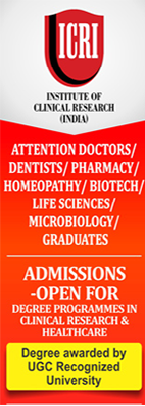 Similar
to engineering and management, the healthcare sector has also experienced some
drastic changes in the past few years. The changes in the healthcare sector are
limited to services and discoveries at the same time they are also limited to career
prospects as well.
Similar
to engineering and management, the healthcare sector has also experienced some
drastic changes in the past few years. The changes in the healthcare sector are
limited to services and discoveries at the same time they are also limited to career
prospects as well.
Previously
the students could only think of medical sector as a career prospect where they
could either become a doctor or a scientist. However, today the scenario has
changed completely and students can make Career in Pharmacovigilance too.
What is Pharmacovigilance?
The
science of studying long and short term effects of medicines on individuals is
known as Pharmacovigilance. Today, this form of science has gained popularity
amongst young generation and more and more students are looking forward to make
a career in this challenging sector.
In
order to ensure that students get acquainted with their job responsibilities in
the best possible manner, here below are mentioned the key responsibilities.
What are the reasons as to why the students should opt
for Pharmacovigilance as their career options?
As
a career option Pharmacovigilance is an excellent choice which is option for the
pharmacy graduates. It is a scientific discipline which is mainly connected
with the reporting and analyzing of the side effects of drugs. It is due to
this branch of science that the drugs which we consume are mostly safe. Also
those drugs which are found harmful are taken off the shelves. The job of the pharmacovigilance
professionals is to continuously monitor the drugs that are already being sold
in the market and also with regards to the safety of the drugs in clinical
trials. When the side effect of a drug is reported, the Pharmacovigilance professional’s
task is to compile the event in the proper databases, follow up with the case so
as to gather more information. This information is now forwarded to the regulatory
authorities.
Job Responsibilities
Before
opting for career growth in pharmacovigilance it is critical to have a basic
understanding of the job responsibilities. The job responsibilities to be
fulfilled while opting for a Career
Path Of Pharmacovigilance include:
Conducting Research & Surveys:
The healthcare sector is in a constant stage of evolution. This is why it has
resulted in the development of clinical research sector as well. In every
clinical research career, professionals have to carry out surveys and
researches continuously so that they are able to out the problems prevailing in
the sector.
Knowledge of steps involved in production of a new
drug: Introducing a new drug in the market is
not a single step process. It is a process which happens only after a series of
steps have been completed. This is why you should have adequate knowledge of
all these steps while opting for pharmacovigilance career prospects if you wish
to succeed in the sector.
Likely Hazards Due to Consumption of Drugs:
Whenever a new product is introduced in the market, it is a fact that the
consumers are not aware of the hazards caused due to it. It is the
responsibility of the medical professionals to assess the problems that can
arise after consuming a particular drug.
Protect Patients from Hazardous Consequences:
The role of these medical professionals is to find out possible hazards at the
same time they will also have to figure out how to protect patients against
them.
Below
is an outline of two job roles that are absolutely essential to clinical
research trial.
Clinical Programming:
A clinical programmer is a very important part of any clinical project. These
people spend most of their time working with the clinical research team to
analyze, organise data and manage databases.
Clinical Research Associate:
These people plan, carry out and analyse clinical trials. Clinical trials are
the process of studying various aspects of a medical product. For example they
might test for side effects, health benefits, potential risks and general
benefits in order to assess whether a product should go to or be taken of the
market.
In
order to complete a course it usually takes around four years to complete a
degree in most related subjects such as Pharmacology, Life Sciences, Information
systems or Nursing. On the other hand in order to become a Clinical Programmer
you need to have around two years experience in pharmaceutical programming in a
clinical research environment. This can be a very rewarding job when new and
exciting results are produced and trials run smoothly and successfully.



Leave a Reply